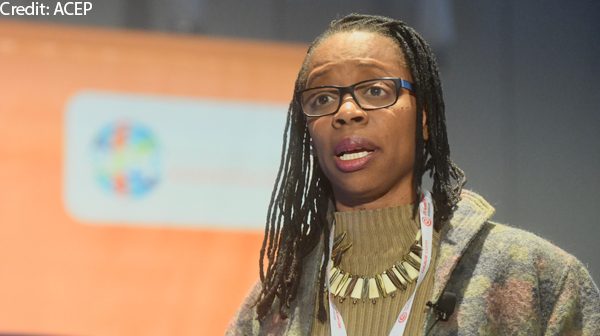
WASHINGTON, D.C.—Sheryl Heron, MD, MPH, FACEP, is vice chair of administrative affairs in the Emory University Department of Emergency Medicine in Atlanta, Georgia. She’s given the commencement speech at Howard University College of Medicine. And she’s a leading national voice on equity and inclusion in health care.
Explore This Issue
ACEP17 Tuesday Daily NewsBut the presenter of this year’s James D. Mills, Jr. Memorial Lecture, “Overcoming Cognitive Blind Spots to Improve Outcomes” still gets frequently stopped at airports because she’s a Jamaican woman with dreadlocks.
“Cognitive bias is really, at the end of the day, something we all have,” Dr. Heron said. “It’s based on what we’ve seen, what we’ve been exposed to, what we’ve been challenged to believe, true or not. It’s about perception.”
Dr. Heron wants all emergency physicians to understand that bias exists, and to address it honestly and openly. She recounts the time when she was treating an African-American male who was found unconscious and suspected of substance abuse. She assumed from the team’s presentation that, because the patient was homeless, he was inebriated to the point of passing out. In reality, the man was slated to sing for President Obama the next day at the White House and had taken too much Seroquel, thinking it was blood pressure medication, in his excitement.
“I might have destroyed this man’s opportunity to go to the White House because I anchored in my thoughts,” Dr. Heron adds. “Me. I thought I was Miss Diversity and Inclusion. And I could have failed him.”
To help frame the process, Dr. Heron promotes the PAUSE technique. It pushes physicians, and others, to Pay attention, Acknowledge their reactions, Understand those reactions/judgments, Search for constructive solutions, and Execute on that strategy.
“We’re all trying to figure out how to get around that narrative, how it’s important to make sense in the environment in which we work and the patients which we care for,” Dr. Heron said. “What we can do about it is really what I’m asking. I’m asking you a small favor. I’m asking you to … ask yourself, What could I do differently?”
But don’t assume bias means just one thing either.
“People think race automatically,” Dr. Heron said. “It’s not just race. It’s sex. It’s gender. It’s LGBT. Gender expression. Gender orientation.”
Dr. Heron said the opportunity is heightened because the “national conversation” is now focused on stereotypes, racial issue, and other biases. She is hopeful that asking people to see others as individuals, not as stereotypes, begins to change the narrative and, by extension, impact patient care.
Pages: 1 2 | Single Page




No Responses to “We All Have Biases—It’s How You Manage Them That Matters”